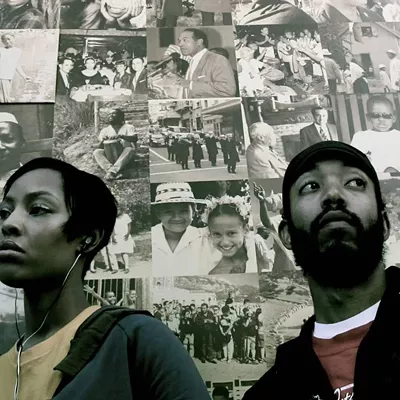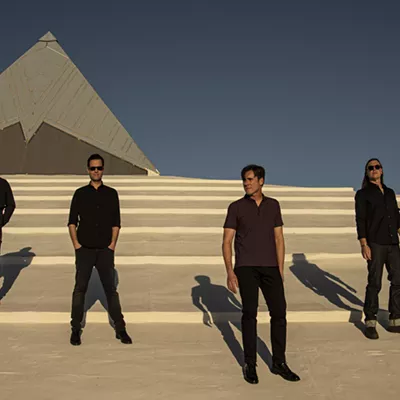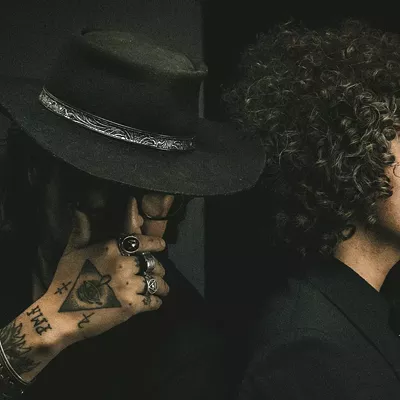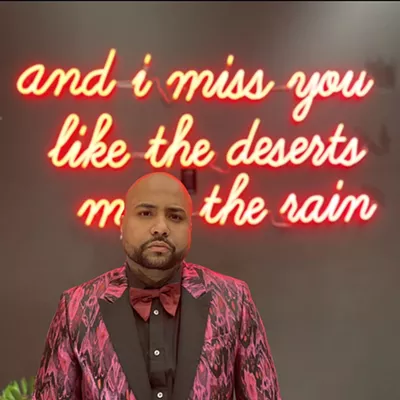It's looked upon by most outsiders as a hobby, at least right up until such time as said band "makes it," either by being signed to a label (increasingly unlikely as the recorded music industry collapses in slow motion) or by attracting significant national attention in some other fashion. Conversely, most participants in any local band scene tend to be the sort of crazy dreamers who will pursue extra-local success far beyond the dictates of prudence.
For the members of Chango Malo, a local rock unit of fiery repute (due largely to their hyperkinetic live shows), there's simply no choice in the matter.
"Think of how many artists died broke as fuck," says drummer/resident beardo Jericho Davidson. "It's not about money or success. This is what I have to do. It's not because I want to try to achieve 'celebrity status' or anything like that. I don't have to force myself to do any of this. In fact, if I don't do it, I freak out."
The Weekly sat down with Davidson and bandmates David Clark, Quin Davis, Justin Lillie, Ian Philabaum and recent addition Tom Beach (formerly of the now-defunct Manifold) in their new practice space on the southside to talk (Wild) turkey on the impending release of The Whiskey Years, the band's first full-length offering in four years.
It seems it was a rough stretch.
"It was supposed to come out six or eight months ago," says Lillie, CM's bass player, of The Whiskey Years. As bad luck would have it, however, the material recorded through November 2006 was lost when the hard drive, without a backup, that contained the master tracks was dropped from the mere distance of 3 feet. In that span of less than a second, the first iteration of The Whiskey Years went from nearly complete to nothing. Zip. Bubkes. Gone.
The band was characteristically undaunted. "It was about a week of downtime to see if the hard drive could be recovered, and then when we found out (it couldn't), we just jumped back in," says Lillie.
Lillie's pluck notwithstanding, guitarist Philabaum acknowledges they took a serious blow. "Instead of being able to write more (new material), we had to go back in and re-record the entire thing. So it set us back as a band substantially. We'd be working on a new record right now if this hadn't happened."
The hard drive catastrophe was not the only tribulation--their newly purchased van was totaled; guitarist Ryan Couch departed for graduate school in Portland, Ore.; and a dear friend, Jason "Blood" Mashburn, passed away last August--but it would have an indelible impact that, in retrospect, they look upon as mostly positive.
"We got to hear some form of the final record to that point, because Tom (Beach) had been doing rough mixes that weren't on that hard drive," says David Clark, who plays the hardcore sax. "Then we got the chance to step back and rethink the songs a little."
The consensus is that The Whiskey Years is much stronger as a result. "There was a decision in the beginning, even before I was in the band, to not let things slide. If something wasn't right, we made a point of not letting it go. We didn't have to settle for anything," says Beach.
As Davidson characterizes it, "We were essentially forced to spend a lot of time with these songs, digesting them, taking them apart and putting them back together. We knew that we wanted a bigger-sounding record, to catch the mood of the band at that moment."
Their mood, as deduced from the contents of The Whiskey Years, is that of a vigorous, mature, guitar-based six-piece, eager to put the erroneous pigeonholes in which they've sometimes been placed--"funk metal," "punk-funk," "ska," whatever--to rest. "We're a fucking rock band," says the band's soulful belter, Davis, emphatically.
They are also quite the assortment of goofs. Davidson enjoys publicly disrobing more than any man of his generous proportions should. Philabaum, aka Philth (also the title of TWY's ultimate song) delights in being stinky; Beach professes to love The Tragically Hip for reasons into which we shall not delve. And then there's Davis' lone dreadlock, a subject of intense curiosity.
"I was thinking about getting a microphone for it," he says. "That's (been) everyone's joke so far--do my Bobby Brown impression. It's amazing, kinda, how much people focus on it. It's really interesting, kind of like a social experiment. Everybody's just, like, mesmerized."
Adds Davidson, "That's some 'Tony and Guy' shit right there."
Born of nearly a lifetime of friendship, the easy rapport that the members of Chango Malo have with one another is readily apparent. This is most pronounced in the live setting. "(W)e feed off the energy. It goes from us to (the audience) and then bounces back to us," says Davidson. "You can tell when people are having a good time. It's weird--it's physical; it's mental; it's almost sexual in a way." The rest of the band laughs.
Later, Lillie blurts: "The first thing I think about when it comes to playing live is that it just stems from the fact that we like playing with each other." The interview almost doesn't recover from the ensuing bout of the giggles.
Each member of Chango Malo admits they dream of larger success, fame, getting "big" in the popular sense. But pursuit of what seems to be a pipe dream is not the band's fundamental motivation. It's much more elemental than that.
Davidson summarizes his (and Chango Malo's) real impetus in stark, sincere terms: "Music is my religion. It's my god. That's how it is for me. Since I was a kid, it's the only thing I've been able to believe in. I don't have religion; I don't have family; I don't believe in the government; I don't believe in anything other than music. I believe in Bad Brains; I believe in the Minutemen. I believe in Chango Malo. You know?"
















